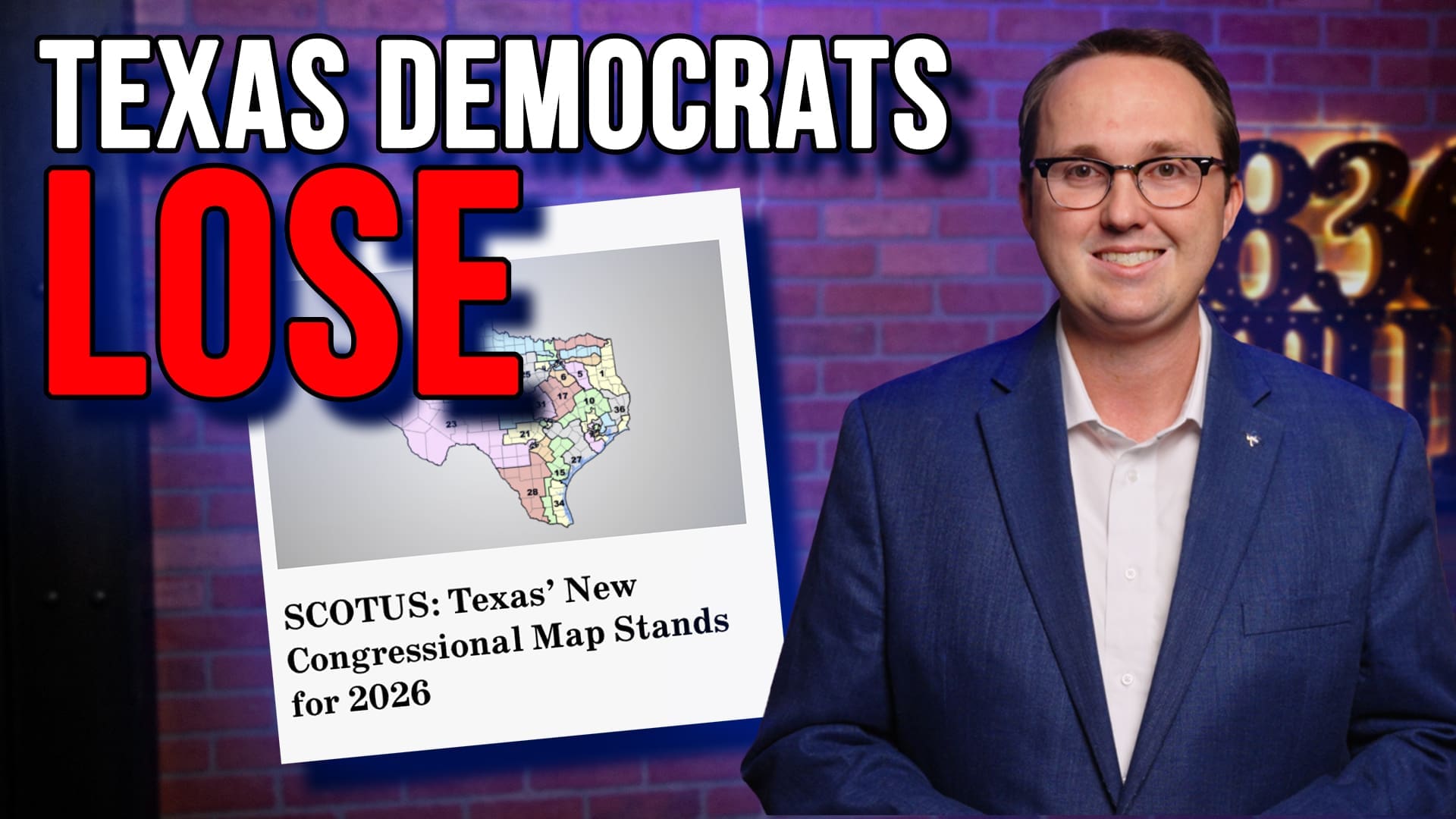“I don’t think these elected officials really understand how many people are hanging on to their home with a thread or a string,” said Diane Covey, a 20-year resident of Denton County. At 67, she recently retired, while her 72-year-old husband retired in 2018.
Her 2022 property tax statement from the Denton County Tax Assessor, due on January 31, 2023, for $5,056.41 arrived in November. “Was this already presented to me earlier in the year, and my husband protested these? Or is this a new bill, and I have an opportunity to protest? [It] doesn’t really give me any instructions except, ‘You have to make this payment.’”
The most expensive bill you pay every year is your property taxes.
Covey and others are struggling paying increasingly mountainous Texas property taxes. According to Texans for Fiscal Responsibility, the overall property tax burden in the state metastasized from $10.5 billion in 1994 to $71 billion in 2020. That’s more than a 560 percent increase. TFR also points out that this explosion has far outpaced population growth. Since 2000, the overall property tax burden spiked 216 percent, while the state population grew by only 40 percent. This trend landed the Lone Star State the sixth most burdensome property tax in the nation, according to the Tax Foundation’s 2021 report.
“The entire system is moving in a terrible direction,” James Quintero of the Texas Public Policy Foundation told Texas Scorecard. “People are really getting crushed by the size and burden of their property tax bills.”
It’s not just policy aficionados who feel this way, but also the taxpayer largely forgotten by their public servants in state and local government.
“Never have we been so helpless to [the] fact my government can tax property they obviously know nothing about,” an unnamed property owner in El Paso County wrote in his 2016 complaint. This was after he protested the taxable value assigned to his property by the El Paso Central Appraisal District. His was one of four complaints filed that year, but this likely only reveals a fraction of the discontent present.
Texas Scorecard obtained these and other complaints through an open records request to the Texas comptroller, the state agency that processes taxpayer monies. On August 30, 2022, Texas Scorecard requested records of complaints against appraisal districts from 2016 to 2021. Over the course of 21 days, communications ensued involving the comptroller asking for clarification of this request, then replying with information about what they did and did not have. It was during these communications that we learned about the existence of the tax liaison officer (TLO). Appraisal district areas “with a population of more than 120,000” are required to appoint someone to this position, according to Carol McCord, senior legal counsel at the Texas comptroller. A TLO is “responsible for resolving disputes that do not involve matters that are subject to protest under Tax Code 41.41.”
In other words, taxpayers frustrated with their appraisal districts can file complaints with their TLO, should their appraisal district have one.
Texas Scorecard requested, and was given, complaints that TLOs across the state received that were submitted to the comptroller during the given time period. “We have spreadsheets with the Taxpayer Liaison Officer (TLO) comments we receive for each year going back to 2014. (We won’t get the TLO data for 2022 until the end of this year.)” McCord wrote. “Most years have 1 excel file per county, but for at least one year, the CAD submitted a separate excel spreadsheet for each complaint. They are not divided up between [Appraisal Review Board] and [Central Appraisal District] complaints.”
Appraisal review boards (ARBs) hear formal protests by owners protesting the property values assigned by their appraisal district. As part of the tax-hiking cartel process, if a homeowner is furious about his or her high taxes, they are shuttled like cattle into the process of protesting the taxable values assigned by the appraisal district.
This takes up valuable energy and pressure from the ones who actually set the rate at which property owners are taxed: city council members, county commissioners, school board trustees, and more. The TLO complaints we received show instances of taxpayers being put through further abuse.
The identities of most individuals in the following complaints were redacted. As a default, Texas Scorecard is using the pronouns “he” and “his.”
“THE REVIEW BOARD WAS NOT ABLE TO FACTUALLY & SCIENTIFICALLY REVIEW MY INFO[,] INSTEAD USED NON-GELMAN METHODOLOGIES TO KEEP OUR VALUES HIGHER THAN [necessary],” typed a Denton County property owner on May 19, 2016. His was one of close to 80 complaints in a consolidated spreadsheet of statewide complaints that year.
There’s also Dolores Zarate, who described problems in her June 2021 complaint regarding her protest hearing of the values the Cameron Central Appraisal District assigned her. “I would never have imagined that the Appraisal District would present grave inaccurate evidence. The building in question was not built in 1994, it was completed in 1985—a 10-year difference.” She also complained that before her hearing, she did not receive CCAD’s evidence for their value. “Every hearing participant should be provided with the evidence three days in advance, just like I provided my evidence in advance, it should not have to be requested.”
Hers was one of two complaints in the CCAD area that year, though this is probably a fraction of the discontent present. The other was from a retired military veteran inquiring about why he hadn’t heard back about rescheduling his protest hearing.
A Fort Bend County property owner complained about an apparent lack of consideration and justice when he protested. “The problem was that the panel was not the least bit interested in considering the truth and reality of property values in my neighborhood,” he wrote in his January 25, 2016 complaint. “I felt that, once again, I was in a kangaroo court, and that the outcome of my hearing had been decided before I even walked in.”
Covey herself complained about a lack of accountability in her 2021 encounter. In September of that year, she filed a complaint. In previous years, protesting for her had been a rather positive experience. 2021 was different. “I can’t believe our appeal was over the phone with multiple people and with no additional microphones on the appraisal board end,” Covey wrote. She also complained that Beverly Henley, the chair of the ARB, was “extremely rude, very harsh and short in the manner to which she spoke to my husband and me.”
Covey gave more details in an interview with Texas Scorecard. When the call started, Covey asked who was listening in on the call, and twice Henley was evasive, saying only they were appointed by a judge and the law required they had to be a part of the review board. “Well, that doesn’t tell me anything,” Covey said. “She also reminded my husband and I—extremely rude—that we were only allowed 15 minutes, and we had almost taken up 30 minutes. I told her the reason for that is I couldn’t hear clearly, and she said, ‘Well, that’s because there’s other reviews taking place.’”
Complaints of hearings conducted by phone in 2021 weren’t isolated to Covey, or even Denton CAD. Multiple complaints were filed that same year of protest hearings conducted over the phone within the Hidalgo Central Appraisal District. Jose Rodriguez, in particular, complained of being harassed by an appraiser. His was one of 12 complaints filed that year in the Hidalgo CAD area, but this is probably only a fraction of the discontent present.
When Covey tried complaining about Henley’s behavior, like with Chandler Crouch’s situation, she encountered a system with no accountability. She emailed the appeals department manager of the Denton Central Appraisal District, George Clerihew, who apologized for Henley’s behavior. “I am truly sorry about your hearing experience,” he wrote in an email reviewed by Texas Scorecard. “Owners who go before the board should at least feel like they were treated fairly and professionally by the board members.” He continued that he would forward Covey’s complaint to Bea Lorne, their taxpayer liaison officer, who would listen to the hearing and forward Covey’s complaint to the state comptroller for their records. “Bea will also share your experience with the ARB chairperson who happens to be Ms. Henley. She can listen and review the hearing as well.”
“So, it’s gonna go back to her? Are you serious?” Covey asked.
Clerihew added in his email that DCAD had no authority over the ARB. “They work under the Texas Property Tax Code and have their own rules, hearing procedures & bylaws. A request for a new hearing would be determined by the chairperson or officers of the ARB.” This means that if Covey wanted a new hearing, Henley would have to grant it. Otherwise, Covey would have to go for binding arbitration or file a lawsuit.
While members of appraisal review boards should represent the taxpayers, in practice (based on the reviewed complaints and interviews Texas Scorecard conducted), taxpayers have no representation.
“The opinions of the district appraiser is given more weight than the opinions of other appraisers,” a Hays County taxpayer complained in September 2021. This was one of 16 “comments and suggestions” regarding the appraisal review board in Hays that year. Some praised the service they received, but most complained about their experience. “Mr. Jim Rowley, Chairperson, of Hays Central Appraisal Review Board, was rude, disrespectful, and condescending. No opportunity for dialogue,” another Hays County property owner complained. “Decision was a done deal.”
“ARB members should cycle new members in [the] system to avoid good ole boys’ syndrome. The longer the ARB stays in, they don’t become our peers anymore,” complained a Bexar County property owner on August 2, 2016.
But another problem that popped up is that the taxpayers, who have chosen to go the formal hearing route, are not properly notified of when their hearing is taking place. Multiple such complaints were received in the records Texas Scorecard obtained from the Texas comptroller; one of these complaints was from a tax liaison officer at the Tarrant Appraisal District in November 2019. “The only item that has caused problems this year is in the area of failure to receive notices for ARB hearings,” the officer reported. “There were about two hundred that were filed, and most of them showed up for their hearing.”
There is no way for the property owner to prove they did not receive the notice, so it would be better if the code would allow for some method for them to use during this process. Most of the accounts really were looking to be heard on the values of the properties.
Others have expressed disdain and a sense of powerlessness when it comes to appealing values assigned by the appraisal district.
“The appeals process is not financially feasible in a rigged system or one where I am not an expert in the process,” Mike Collins complained in October 2019 regarding his experience protesting values assigned by the Travis Central Appraisal District. “I risk losing the $1,500 minimum cost to appeal. It is clear the system is setup such that the general taxpayer can only get so much information and has limited pushback.”
Collins was one of 23 complaints filed that year against Travis CAD, but this is probably only a fraction of the discontent present.
“We are elderly, not in good health, and are more prone to being less able to deal with governmental and business issues without having a great deal of anxiety,” John and Juliet King wrote in May of 2019, in their complaint describing struggles in protesting the values assigned to their property by Travis CAD.
“Can I do an appeal, you ask? I am 80-year-old, and live on a fixed income,” wrote a property owner in his August 2021 complaint against the McLennan County Appraisal Review Board. There was one complaint filed that year against Travis CAD, but this is probably only a fraction of the discontent present. “If I had enough money for an appeal, I would borrow my grandson-in-law’s shotgun and sit up and guard it all night.”
That quote got a strong reaction from James Quintero of the Texas Public Policy Foundation. “The system is fundamentally broken, and it’s broken at the appraisal district level. It’s broken at the rate setting level, and it’s broken at the legislative level,” he told Texas Scorecard. “What we need the next Legislature to do is to step in and effectively overhaul the entire damn thing.”
Cartel Members
There are three members of the cartel bleeding Texans’ wallets to feed the never-satisfied bellies of state and local governments.
First are the appraisal districts. As of today, there are 254 of them across the state. Created by the Texas Legislature in 1979, an appraisal district sets the taxable value of a home, apartment building, or any other property’s taxable value. Each appraisal district has a chief appraiser, who runs the appraisal office. It’s important to remember that they alone do not set your tax bill, they only assign a taxable value to your land, home, store, or the apartment building you live in. The Texas Public Policy Foundation states the values these districts assign are “subjective valuations.”
“Appraisers are biased,” wrote a property owner in a June 2019 complaint in the Montgomery Central Appraisal District area. His was one of more than 20 complaints that year, but this is probably only a fraction of the discontent present. The excel sheet for that year also contains multiple positive comments, as well as negative ones.
“That’s absolutely true,” Chandler Crouch told Texas Scorecard about appraiser bias, noting that “anytime there is a generalization, there’s always an exception.” Crouch, a North Texas realtor, has helped tens of thousands protest their appraisals for free in Tarrant County. He shared his experience protesting taxable values assigned by Tarrant Appraisal District. “Whenever I go to protest, there are so many times where the appraiser is bias[ed] in favor of the appraisal district and against the homeowner. It shouldn’t be that way.”
There’s even questions about the subjective valuations the appraisal districts assign your home.
“It’s become a bit a running joke out here in how the TCAD is manipulating house values and land values up and down each year – sometimes having land values at 100-200% of the house values – ie land values of $500k-$600k, with house values of $300k-$500k,” complained Jim Nawrocki in January 2019 against the Travis Central Appraisal District.
“Where they come up with this stuff, I have no idea,” Covey complained about the subjective valuations from Denton CAD. “The value percentage, it goes from 3.1 percent, to 12 percent, to 15 percent from year in and year out. Back in 2020 they said there was a negative change of 30.39 percent.” And good luck trying to figure out how the appraisal district arrives at these numbers. “I’ve tried many times to try and ask and when you talk to them, you might as well be on a Ferris wheel going round and round and round, or a roller coaster.”
“She hit the nail on the head,” Crouch commented. He used the term “appraised value” as an example. “In any common everyday conversation, the person you’re talking to will understand that that’s what the house is worth, because that’s what it would appraise for. Well, in property tax land, that’s not true.” He explained that appraised value is a value calculated after certain exemptions are applied to the mix.
When you get down to that basic of a term, and you’re not even speaking the same language, then the average person has no hope to understand the system enough to be effective.
But the ones who actually set your property tax bills are the next member of this cartel: local governments, such as counties, cities, school districts, water districts, and others. They take the taxable value generated by the appraisal districts and approve the tax rate to multiply these values by. No matter what value appraisal districts assign, your city council members, county commissioners, school board trustees, and other elected public servants can adopt the no-new-revenue rate, which keeps tax bills more or less stable in the aggregate. The NNRR, when adopted, ensures these governments collect the same amount of revenue, not less, from existing taxpayers. It does not affect cash flows from new growth.
To deliver property tax relief, a rate below the NNRR would have to be adopted.
The third partner in this cartel is the state government, including the Texas Legislature. It created and retains overall authority over the appraisal districts, the counties, cities, school districts, and other local governments.
While Texans have long complained about this set up and the ballooning bills it created, taxpayers are increasingly crying out for relief. August 2022 polling from the Defend Texas Liberty PAC found that, of those polled, 66 percent wanted the Texas Legislature to use the majority of the expected $27 billion surplus to deliver property tax relief.
Historically, when they become upset over their property tax bill, taxpayers are redirected by elected public servants from focusing their energies against the ones who actually set the tax bills (city council members, county commissioners, school board trustees, etc.) to the appraisal districts, who merely assign a “subjective” taxable value to their home.
Thus taxpayers go to the appraisal districts to protest these values.
According to information obtained from the Texas comptroller, the numbers of taxpayers feeling the need to protest keeps growing. In 2016, more than 1.5 million protests were filed to the Appraisal Review Board. In 2020, that exploded to more than 2.2 million, a 42 percent increase.
That’s just the total number of protests filed altogether. Focusing solely on ones filed by single-family homeowners, from 2016 – 2020 these protests skyrocketed by 41 percent, from more than 888,000 to more than 1.2 million.
A much smaller increase was seen amongst owners of multi-family residences, meaning buildings like apartment complexes. That increased by only 14 percent (more than 49,000 to more than 56,000) but this is likely much lower than it could be. Property taxes on such buildings are passed down by the property owners to the renters, who cannot protest assigned taxable valuations because they do not own the property in question. “Renters do pay property tax,” economist Vance Ginn told Texas Scorecard. “It’s just through the form of higher rent.”
Protests would be unnecessary if local public servants cut or kept spending under control and lowered tax bills.
“There are plenty of problems at the appraisal district but the real demand and burden for our tax bill comes from the local taxing entity, it comes from the budgets that they pass,” Crouch told Texas Scorecard. “The only problem is that the timeline of how all this works, and the system the way it’s set up now, really does give more power to the appraisal district than what they should have.”
As a result of running this rat race the tax-hiking cartel has created, too many taxpayers have complained of encountering strife, abuse, and incompetence when they engage with the appraisal system. Sometimes they also complain of being caught in a strange world where they don’t understand what’s going on, or in at least one instance being punished for the government’s error. In his 2019 complaint, a property owner identified only as “Rodriguez” that he was “taxed on property not owned.” His was one of 30 “comments and suggestions” regarding the Nueces Appraisal Review Board that year. Other comments included an inquiry as to “why did my property go up more than 10%”, and multiple new home owners wanting to know how to protest their property values.
“I have long had a feeling that these various appraisal districts, who have a lot of authority, but there are so many rules and guidelines. It’s really hard for residents to keep track,” Covey told Texas Scorecard. “They speak an internal language that they understand within their industry. But when they’re communicating with residents, it’s extremely confusing.”
Crying Out In the Wilderness
Records obtained from the comptroller indicate taxpayer abuse in the tax-hiking cartel is a feature, not a bug.
“[Gary Savage] was extremely disrespectful, rude, uncivil, abrasive, and uneven tempered. I was not allowed to ask any questions,” a property owner complained in 2021 regarding his protest hearing against the Montgomery CAD value.
“I am at my end with dealing with incompetent people who have no customer service protocol,” wrote Kara Decker in her April 2021 complaint regarding her dealings with the ARB of Travis CAD.
State Rep. Brian Harrison (R–Waxahachie) was angered to hear of taxpayers being abused. “Government officials at all levels, whether elected, and certainly if you’re an unelected bureaucrat, you are there in your job to serve the people,” he told Texas Scorecard.
Texans for Fiscal Responsibility CEO Tim Hardin, however, was not surprised. “I’ve worked in government. There’s not any focus on customer service, because there’s no reason for accountability,” he told Texas Scorecard. “There’s no real hope of [better customer service] ever being the case unless there’s major upheaval and reform to the system.”
“The entire system and oversight is a closed loop system designed purely to drive increased revenue for the county and the manner that the review was conducted clearly demonstrated that perception as reality,” wrote Steve Pracht in his July 2021 complaint against the Denton CAD. “It is unfortunate that a willingly blind eye is turned from the corruption and favoritism but when you are able to play the roles of judge, jury, and executioner, the taxpayer is powerless.”
Conclusion
This investigative series is a sequel to our coverage of Texas’ oppressive property tax system launched last year. In June 2022, Texas Scorecard exposed that the Fort Worth-area Tarrant Appraisal District’s (TAD) director of residential appraisal—Randy Armstrong—had targeted Chandler Crouch.
Armstrong had filed complaints against him to the Texas Department of Licensing and Regulation (TDLR). Crouch denied all allegations Armstrong made against him, and he was later exonerated when TDLR closed the case against him. Armstrong and his superior, Chief Appraiser Jeff Law, received slaps on the wrist by the TAD Board of Directors in the form of temporary suspensions as punishment for targeting Crouch. The TAD board denied any knowledge or involvement in Crouch’s persecution.
As a result of this incident, Texas Scorecard launched an investigation to determine if Crouch’s treatment at the hands of an appraisal district bureaucrat was an isolated incident. This investigation uncovered numerous complaints against the appraisal system statewide, indicative of the abuse dished out to taxpayers by the tax-hiking cartel of appraisal districts, local governments, and the state government.
One Travis County property owner expressed that action is needed.
“I’m a middle of the road type of guy, but my experience let me know why Donald Trump and Bernie Sanders got so many votes in the primaries. I’m convinced that your department is part of the problem, and no one [seems] to care,” he wrote in his complaint on August 22, 2016, after his attempted protest. This owner had a 2 p.m. appointment for his protest hearing, but he was informed upon arrival that his appointment may be delayed by two hours. He wrote that when he tried asking someone at the counter if that was ok, a police officer told him not to speak like that to the employee.
You cannot challenge what anybody does or says[;] you just have to sit there and let the system roll over you.
In Part 2 of this series, Texas Scorecard will expose who ultimately controls and is responsible for the appraisal districts.
This article was updated to correctly attribute the target of a 2021 complaint by a Hays County taxpayer.
No ads. No paywalls. No government grants. No corporate masters.
Just real news for real Texans.
Support Texas Scorecard to keep it that way!





